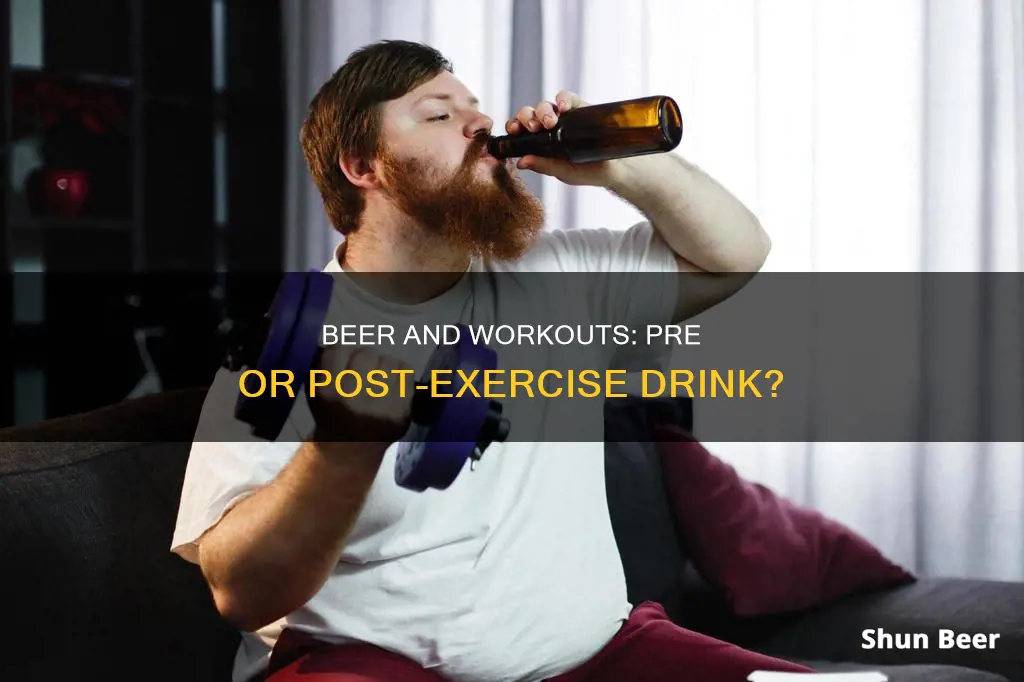
Drinking alcohol before working out is generally not recommended due to the negative impact it can have on coordination, balance, and judgment, which can increase the risk of injury. Alcohol also acts as a diuretic, increasing fluid loss through urination and sweating, leading to dehydration. Additionally, alcohol affects the cardiovascular system and can cause high blood pressure and, in chronic heavy drinkers, heart failure. However, some studies suggest that moderate alcohol consumption may not significantly impair performance and could even provide potential benefits in combination with exercise. These benefits include enhanced motivation and reduced fear and anxiety during competition. Ultimately, while drinking a small amount of alcohol before working out may not drastically impact the average person, it is important to consider the potential risks and take appropriate precautions to ensure safety.
| Characteristics | Values |
|---|---|
| Effect on endurance exercises | May have an impact on endurance exercises |
| Effect on sprint time | No effect on sprint time |
| Effect on strength | No effect on strength |
| Effect on short-burst exercises | Probably won't have much of an effect on short-burst exercises |
| Effect on core temperature | Drop in core temperature, decreasing performance |
| Effect on balance | Decreased ability to balance |
| Effect on reaction time | Decreased reaction time |
| Effect on clear thinking | Impaired judgement |
| Effect on muscle recovery | Impaired muscle recovery |
| Effect on sleep quality | Significantly lower sleep quality |
What You'll Learn
- Drinking beer before a workout may not affect strength or short-burst exercises
- Alcohol may negatively impact endurance exercises
- Drinking beer before a workout may not be a good idea if you're chasing serious results
- Alcohol may not be the best thing to consume before a quick-moving athletic competition
- Drinking beer before a workout may not be a good idea if you're trying to lose weight

Drinking beer before a workout may not affect strength or short-burst exercises
Drinking beer or other alcoholic drinks before a workout may not affect strength or short-burst exercises. However, it is important to note that alcohol can impair coordination, balance, and judgment, increasing the risk of injury during a workout. Additionally, alcohol is a diuretic, which can lead to dehydration when combined with sweating during exercise.
Several studies have investigated the effects of alcohol consumption on workout performance. One study found that cyclists who drank a moderate amount of alcohol before riding a bike for an hour had 4% less leg power compared to when they were sober. However, there was no significant difference in sprint time or strength between the sober and drunk groups. Similarly, a Brazilian study found no difference in neuromuscular performance between groups who consumed alcoholic or non-alcoholic beer before a gym session, although alcohol combined with sleep deprivation resulted in lower quad muscle activation.
While drinking beer before a workout may not significantly affect strength or short-burst exercises, it is important to consider the potential risks associated with impaired coordination, balance, and judgment. It is always advisable to prioritize hydration and adequate sleep to optimize workout performance and reduce the risk of injury.
Overall, while drinking beer before a workout may not affect strength or short-burst exercises, it is important to consume alcohol in moderation and prioritize overall health and safety when incorporating alcohol into your routine.
Beer and Prep: What's the Deal?
You may want to see also

Alcohol may negatively impact endurance exercises
Firstly, alcohol is a diuretic, which means it increases urination. When combined with sweating during a workout, dehydration can occur more easily. Dehydration can lead to muscle fatigue and decreased performance. Additionally, alcohol affects your body's ability to regulate temperature, resulting in a drop in core temperature, which further reduces performance.
Secondly, alcohol impairs coordination, balance, and judgment. Even a single drink can affect brain chemistry, increasing the risk of injury to yourself and those around you. The full effects of alcohol may not be immediate, and you may not feel the full impact until you are well into your workout, which can be dangerous.
Furthermore, alcohol may affect endurance exercises by impacting your energy levels. Your muscles cannot use alcohol for fuel, and alcohol may also inhibit your liver's ability to create glucose. This can make it challenging to maintain energy levels during endurance exercises.
While some studies suggest that alcohol does not significantly impair performance, it is important to note that these studies involved moderate drinking, not excessive consumption. Excessive drinking can have more severe negative effects on the body and performance.
In conclusion, while drinking a beer before working out may not completely derail your endurance exercises, it is important to consider the potential negative impacts on your body, performance, and safety. It is always advisable to prioritize hydration, adequate sleep, and proper nutrition to optimize your workouts and overall health.
Beer Drinking: Dry Skin Culprit or Coincidence?
You may want to see also

Drinking beer before a workout may not be a good idea if you're chasing serious results
Drinking beer, or any alcoholic beverage, before a workout may not be a good idea if you're chasing serious results. While it may not seem like a big deal, alcohol can negatively impact your workout performance and overall health in several ways.
Firstly, alcohol impairs coordination, balance, and judgment. Even a single drink can affect your brain chemistry, increasing the risk of injury to yourself and those around you during your workout. The effects of alcohol may not be immediately apparent, and you may not feel the full impact until you are well into your workout, which raises the chances of serious injury.
Alcohol also acts as a diuretic, increasing urination and dehydration, especially when combined with sweating during exercise. Dehydration can lead to muscle fatigue and, in more severe cases, heart arrhythmia. Additionally, alcohol slows down your reaction time, strength, endurance, and aerobic capacity, compromising the effectiveness of your workout.
Alcohol consumption can disrupt your sleep, which is crucial for muscle recovery and optimal performance. A study on rugby players found that their lower-body power decreased significantly after a night of binge drinking and limited sleep.
Furthermore, alcohol interferes with your body's ability to synthesize protein and store glucose, hindering muscle recovery and energy levels for your next workout. While alcohol may give you a temporary boost in confidence and reduced anxiety, it does not provide any performance-enhancing benefits and may even hinder your endurance by affecting your body's ability to regulate temperature and blood flow.
Lastly, alcohol is often high in calories, especially dark beers, which can sabotage your weight loss efforts. Binge drinking is also associated with overeating the following day, further impacting your fitness goals.
In conclusion, while an occasional drink before a workout may not significantly impact casual exercisers, it is generally not recommended for those seeking serious results. The negative effects of alcohol on coordination, cognitive function, hydration, sleep, and recovery can compromise the quality of your workouts and hinder your overall fitness progress.
Beer and Birth Control: Is It Safe to Mix?
You may want to see also

Alcohol may not be the best thing to consume before a quick-moving athletic competition
Alcohol also dilates your blood vessels, pushing blood out to your limbs and away from your core, resulting in a drop in core temperature. This can further hinder performance, especially in quick-moving athletic competitions. Additionally, alcohol may stop your liver from creating glucose and affect your energy levels, which is detrimental to endurance exercises.
The effects of alcohol on the body are well-known and can range from mild, such as skin flushing, to more severe symptoms like vomiting and passing out. It is essential to understand that alcohol can impair your judgment and coordination, increasing the risk of injury to yourself and those around you, even if you feel fine.
While some studies suggest that alcohol may not significantly affect sprint time or strength, the combination of alcohol and sleep deprivation can lead to lower muscle activation. Therefore, if you plan to train or compete, it is advisable to avoid excessive drinking the night before to ensure optimal performance and reduce the risk of injuries.
Overall, while drinking in moderation may not be entirely detrimental to your health, consuming alcohol before a quick-moving athletic competition is not recommended due to the potential negative impact on your performance and safety.
Brown Bag Beer: Is Drinking in Public Legal?
You may want to see also

Drinking beer before a workout may not be a good idea if you're trying to lose weight
Drinking beer or any alcoholic drink before a workout may not be a good idea if you're trying to lose weight for several reasons. Firstly, alcohol can impair your coordination, balance, and judgment, increasing the risk of injury to yourself and those around you, even if you've only had one drink. This is especially important to consider if you're planning on engaging in quick-moving athletic activities. Additionally, alcohol acts as a diuretic, increasing your need to urinate, which, combined with sweating during exercise, can lead to dehydration. Dehydration can negatively impact your workout performance and increase the risk of muscle cramping.
Another reason why drinking beer before working out may hinder your weight loss goals is that alcohol provides empty calories. Dark beers, for example, can contain anywhere between 350-450 calories, which can quickly add up if you're consuming multiple drinks. Furthermore, alcohol interferes with your body's ability to create and store glucose, which is essential for maintaining energy levels during endurance exercises. Alcohol also inhibits your muscles' ability to synthesize protein, which can impact your muscle recovery and gains.
While some studies suggest that alcohol may not significantly impair performance in strength or short-burst exercises, it's important to note that these studies involved participants who had only consumed a moderate amount of alcohol. Binge drinking, on the other hand, is likely to result in overeating the following day and negatively impact your workouts due to decreased sleep quality and impaired muscle function. Therefore, if you're trying to lose weight, it's generally advisable to avoid drinking beer or any alcoholic beverage before working out and to prioritize proper hydration and adequate glucose and protein intake to support your body's energy needs during exercise.
Beer and IBS: Is There a Link?
You may want to see also
Frequently asked questions
Drinking alcohol before a workout is not recommended. Alcohol can affect your balance, coordination, and judgment, increasing the risk of injury. It can also cause dehydration and muscle fatigue, and impair your reaction time, strength, and endurance.
Studies have shown that drinking alcohol can lead to a 4% decrease in leg power, which may impact endurance exercises. Alcohol also dilates your blood vessels, pushing blood away from your core and resulting in a drop in core temperature, which decreases performance.
While not directly linked to pre-workout drinking, studies have found that exercisers are more likely to be drinkers and that moderate alcohol consumption may have positive health associations. Additionally, the lure of a post-workout beer can serve as motivation for some people.







